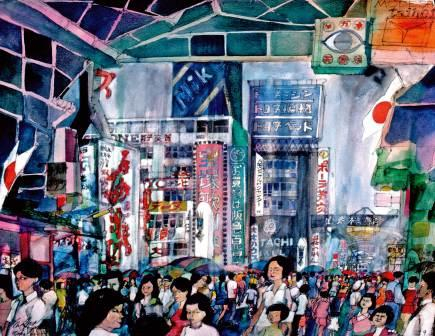Tokyo: Japan’s factory output fell 3.5 per cent in April from the same month a year earlier, while consumer spending also edged lower, though both improved from the month before, the government said on Tuesday.
Earlier, the government reported that the consumer price index fell 0.3 per cent in April for the second straight month of deflation. However, excluding both energy and volatile fresh foods, it rose 0.7 per cent.
The world’s third-largest economy has been stuck in the doldrums despite massive monetary easing aimed at vanquishing deflation, which tends to discourage corporate investment and consumer spending.
Though the latest data present a mixed picture and are better than some economists’ forecasts, Prime Minister Shinzo Abe is seeking backing from his Liberal Democratic Party and its coalition partner, the Komeito, for a postponement of a sales tax hike due next year, out of concern the recovery is too weak to endure a fresh hit to consumer spending.
In April, consumer spending fell 0.4 per cent in April from a year earlier, though incomes rose 0.7 per cent. Unemployment was flat at 3.2 per cent.
Industrial output rose 0.3 per cent from the month before, stronger than expected, in one sign the latest dip in growth may be moderating, said Marcel Thieliant of Capital Economics.
But he noted that private investment remains weak.
At a summit of the Group of Seven rich nations last week in central Japan, fellow leaders balked at Abe’s call for a joint recognition that the world economy is on the brink of crisis. But US Treasury Secretary Jacob Lew, at meetings leading up to the summit, did express concern over the potential impact of a sales tax hike on Japan’s recovery.
Abe has cited the G7’s backing for using all policy tools the countries can as a justification for pushing back the sales tax hike, reportedly until October 2019 from April 2017.
“The government probably wants to avoid delivering a hammer blow to a fragile economy without seeing solid improvement at the fundamental level,” Margaret Yang of CMC Markets, said in a commentary.
The last time Japan raised its sales tax, to 8 per cent from 5 per cent in April 2014, the economy fell back into recession. Growth has faltered since then, and Abe opted to postpone a tax hike, to 10 per cent, set for October 2015 to April 2017.
Abe’s deputy prime minister and finance minister, Taro Aso, has objected to the latest plan for a postponement. But it’s unclear whether his objection reflects an actual schism within the party or is just a show of support for the ministry he represents.
Opposition parties were expected to raise a no-confidence vote against Abe in parliament on Tuesday. But the Liberal Democrats’ strong majority means they lack the votes to get it passed.













